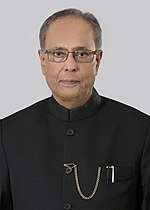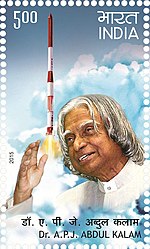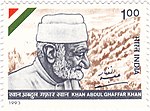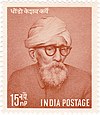


Mukherjee was an Indian politician who served as the 13th President of India from 2012 until 2017. In a political career spanning five decades, Mukherjee had been a senior leader in the Indian National Congress and had occupied several ministerial portfolios in the Government of India. Prior to his election as President, he was Union Finance Minister from 2009 to 2012.

Parliamentarian for over four decades, Vajpayee was elected nine times to the Lok Sabha, twice to the Rajya Sabha and served as the Prime Minister of India for three terms; 1996, 1998, 1999–2004. He was Minister of External Affairs during 1977–79 and was awarded the "Best Parliamentarian" in 1994.

Having debuted in 1989, Tendulkar played 664 international cricket matches in a career spanning over two decades. He holds various cricket records including the only player to have scored one hundred international centuries, the first batsman to score a double century in a One Day International and the only player to complete more than 30,000 runs in both ODI and Test cricket, scoring a total of over 50,000 runs in all formats.

A Hindustani classical vocalist from Karnataka, Joshi was a disciple of Kirana gharana, an Indian musical school. He is widely known for the Khyal genre of singing with a "mastery over rhythm and accurate notes".

Widely credited as the "nightingale of India", playback singer Mangeshkar started her career in the 1940s and has sung songs in over 36 languages. In 1989, Mangeshkar was awarded the Dadasaheb Phalke Award, India's highest award in cinema

Independence activist, social reformer, and commonly referred as "Loknayak" ("People's Leader"), Narayan is better known for "Total Revolution Movement" or "JP Movement" initiated during the mid-1970s to "overthrow the corrupt and exploitative Congress government".

Carnatic classical vocalist Subbulakshmi was from Madurai, Tamil Nadu. She is known for her divine voice & often hailed as "Queen of songs",the first Indian musician to receive the Ramon Magsaysay award for her public service. She was honoured as a resident artist Aasthana Vidwan of Tirumala Tirupati Devasthanam. Tirupati Urban Development Authority (TUDA) has installed a bronze statue of her in the city. Her many famous renditions include the chanting of Bhaja Govindam, Vishnu Sahasranamam (1000 names of Vishnu), Hari Tuma Haro, Venkateswara Suprabhatam, Annamacharya Sankirtanas and Tamil Tevaram.

Aerospace and defence scientist, Kalam was involved in the development of India's first satellite launch vehicle SLV III and was the architect of Integrated Guided Missile Development Program. He worked for Indian National Committee for Space Research, Indian Space Research Organisation, Defence Research and Development Laboratory and was appointed as the Scientific Advisor to the Defence Minister, Secretary to Department of Defence Research and Development and Director General of Defence Research and Development Organisation. Later, he served as the eleventh President of India from 2002 until 2007

Having debuted in 1989, Tendulkar played 664 international cricket matches in a career spanning over two decades. He holds various cricket records including the only player to have scored one hundred international centuries, the first batsman to score a double century in a One Day International and the only player to complete more than 34,000 runs in both ODI and Test cricket.

Industrialist, philanthropist, and aviation pioneer, Tata founded India's first airline Air India. He is the founder of various institutes including Tata Institute of Fundamental Research, Tata Memorial Hospital, Tata Institute of Social Sciences, Tata Motors, TCS, National Institute of Advanced Studies, and National Centre for the Performing Arts.

Widely known as the "Iron Man of India", Patel was an independence activist and first Deputy Prime Minister of India (1947–50). Post independence, "Sardar" ("Leader") Patel worked with V. P. Menon towards dissolving 555 princely states into the Indian union.

Social reformer and leader of the Dalits, Ambedkar was the Chief architect of the Indian Constitution and also served as the first Law Minister of India. Ambedkar predominantly campaigned against the social discrimination with Dalits, the Hindu varna system. He was associated with the Dalit Buddhist movement and accepted Buddhism as a religion along with his close to half a million followers on 14 October 1956.

Known as the "Puratchi Thalaivar" ("Revolutionary Leader"), actor turned politician Ramachandran was the first actor to become the chief minister of the state in the history of India. He was the Chief Minister of Tamil Nadu during 1977–80, 1980–84 and 1985–87; and founder of Indian political party All India Anna Dravida Munnetra Kazhagam

Widely known as "Frontier Gandhi", independence activist and Pashtun leader Khan was a follower of Mahatma Gandhi. He joined Khilafat Movement in 1920 and founded Khudai Khidmatgar ("Red Shirt movement") in 1929

Independence activist, social reformer, and a close associate of Mahatma Gandhi, Bhave is best known for his Bhoodan movement, "Land-Gift Movement". He was given the honorific title "Acharya" ("teacher") and was awarded the Ramon Magsaysay Award (1958) for his humanitarian work

"Saint Mother Teresa of Calcutta" was a catholic nun and the founder of the Missionaries of Charity, a Roman Catholic religious congregation, Which manages homes for people who are dying of HIV/AIDS, leprosy and tuberculosis. She was awarded the Nobel Peace Prize for her humanitarian work in 1979 and was beatified on 19 October 2003 by Pope John Paul II and canonised on 4 September 2016 by Pope Francis

Known as the "King Maker", Kamaraj was an independence activist and statesman. He was the Chief Minister of Madras State during 1954–57, 1957–62, and 1962–63; and founder of Indian political party Indian National Congress (Organisation).

While studying at the University College Dublin, Giri was involved in the Irish Sinn Féin movement. Returning to India, he organised trade unions and brought them to take active participation in Indian freedom struggle. Post-independence, Giri held positions of Governor of Uttar Pradesh, Kerala and Mysore and various other cabinet ministries. He became the first acting President and was eventually elected as the fourth President of India

Known as the "Iron Lady of India", Gandhi was the Prime Minister of India during 1966–77 and 1980–84. During the Indo-Pakistani War of 1971, her government supported Bangladesh Liberation War which led to the formation of a new country, Bangladesh. Gandhi herself was Prime Minister of India at the time of receiving the award.

Known for his slogan "Jai Jawan Jai Kisan" ("Hail to the Soldier, hail to the Farmer"), independence activist Shastri served as second Prime Minister of India (1964–66) and led the country during the Indo-Pakistani War of 1965.

Independence activist and education philosopher, Husain served as a Vice Chancellor of Aligarh Muslim University (1948–56) and the Governor of Bihar (1957–62). Later, he was elected as second Vice-President of India (1962–67) and went on to become the third President of India (1967–69).

Independence activist, lawyer, statesman, and scholar, Prasad was closely associated with Mahatma Gandhi in the non-cooperation movement for Indian independence. He was later elected as the first President of India (1950–62).

Often titled as "Rajarshi", Tandon was an independence activist and served as speaker of the Uttar Pradesh Legislative Assembly (1937–50). He was actively involved in a campaign to get official language status to Hindi.

Social reformer and educator, Karve is widely known for his works related to woman education and remarriage of Hindu widows. He established the Widow Marriage Association (1883), Hindu Widows Home (1896), and started Shreemati Nathibai Damodar Thackersey Women's University in 1916.

Independence activist Pant was premier of United Provinces (1937–39, 1946–50) and first Chief Minister of Uttar Pradesh (1950–54). He served as Union Home Minister from 1955–61.

Civil engineer, statesman, and Diwan of Mysore (1912–18), Visvesvaraya was a Knight Commander of the Order of the Indian Empire. His birthday, 15 September, is observed as "Engineer's Day" in India.

Widely known for his work on the scattering of light and the discovery of the effect, better known as "Raman scattering", Raman mainly worked in the field of atomic physics and electromagnetism and was presented Nobel Prize in Physics in 1930.

Ambedkar is recognised as the "founding father of the Republic of India".Polymath scholar, Social reformer and leader of the Dalits, Ambedkar was the architect of the Indian Constitution and also served as the first Law Minister of India. He was given the honorific title "Babasaheb" ("respected father").